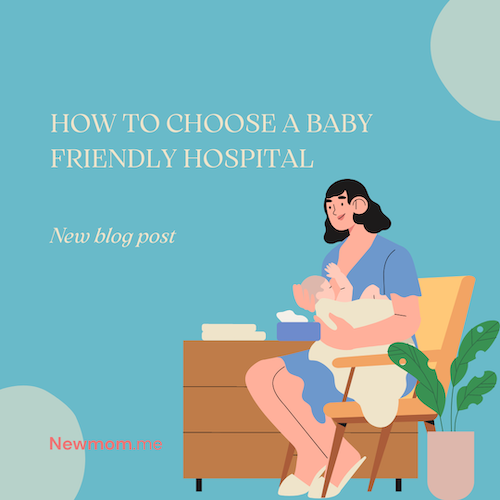Key Takeaways
• Baby-Friendly Hospitals follow Ten Steps to Successful Breastfeeding guidelines
• Research certified hospitals, policies, staff availability, and logistics carefully
• Visit hospitals to assess culture, facilities, and alignment
Welcoming a new baby into the world is a momentous occasion, and the place where you decide to give birth can greatly influence your birthing and postpartum experience. Baby-Friendly Hospitals, certified by the Baby-Friendly Hospital Initiative (BFHI), offer unique benefits, especially for those who intend to breastfeed. In this blog, we will walk you through the key steps and considerations for choosing a Baby-Friendly Hospital that aligns with your needs and preferences.
What Makes a Hospital Baby-Friendly?
Before diving into how to choose, it's essential to understand what "Baby-Friendly" means. These hospitals follow the "Ten Steps to Successful Breastfeeding". The Ten Steps to Successful Breastfeeding serve as the foundational guidelines for the Baby-Friendly Hospital Initiative. Formulated by a panel of international experts, these steps are rooted in scientific evidence and are proven to enhance the commencement and continuation of breastfeeding. The guidelines were most recently revised in 2018.
Step 1: Research and Compile a List
Certified Hospitals: The first step is to look for hospitals that have received Baby-Friendly designation. The BFHI website often offers a directory, or you can call hospitals to inquire.
Reputation and Reviews: Once you have a list, check online reviews and ask for recommendations from friends or family who have had firsthand experiences with those hospitals.
Step 2: Consider Policies and Practices
Hospitals often share their maternity care philosophies and practices on their websites. Look for information on:
1. Immediate skin-to-skin contact after birth
- Importance: Skin-to-skin contact — practice of placing the newborn baby directly onto the mother's bare chest immediately or shortly after birth — facilitates early bonding between mother and baby, and it also stimulates the baby’s breastfeeding instincts.
- Questions to Ask: Does the hospital support immediate skin-to-skin contact after both vaginal and cesarean births? For how long is this contact usually maintained? What are the conditions under which this might not be possible?
- Look For: Statements on the hospital's website or materials that explicitly mention their policy on immediate skin-to-skin contact and its benefits.
2. Rooming-in policies
- Importance: Rooming-in—where the baby stays in the mother’s room instead of a nursery—supports frequent breastfeeding opportunities and helps the mother and baby learn each other’s cues.
- Questions to Ask: Is rooming-in the standard practice? Are there any circumstances under which rooming-in wouldn't be an option? How is nighttime feeding managed?
- Look For: Clear guidelines that indicate that the baby will stay with the mother 24/7, barring any medical emergencies that require separate care.
3. Availability of lactation consultants
- Importance: Lactation consultants specialize in breastfeeding education and troubleshooting. Their expertise can be invaluable for new mothers.
- Questions to Ask: Is there a certified lactation consultant on staff? How soon after birth can a consultation be scheduled? Is lactation consultation available post-discharge?
- Look For: Information on the lactation consultants' credentials, such as IBCLC (International Board Certified Lactation Consultant) certification, and their availability for one-on-one consultations.
4. Approaches to supplementation and pacifier use
- Importance: How a hospital approaches the use of formula supplementation and pacifiers can have an impact on your breastfeeding experience. Some hospitals reserve supplementation for medically necessary situations to encourage exclusive breastfeeding.
- Questions to Ask: Under what circumstances is formula supplementation offered? What is the hospital's policy on pacifier use for breastfed babies?
- Look For: Policies that emphasize the importance of exclusive breastfeeding unless there's a medical indication for formula. Look also for guidelines on pacifier use.
Step 3: Ask Questions
During hospital tours or consultations, consider asking the following questions:
- Is immediate skin-to-skin contact supported for both vaginal and cesarean births?
- What is the standard practice for rooming-in?
- Is there a lactation consultant on staff?
- How is supplementation handled if the baby needs additional nourishment?
- Do you provide post-discharge breastfeeding support?
Step 4: Logistics Matter
Location: Proximity to your home may be crucial for emergencies or if you require frequent visits.
Insurance: Check whether the hospital is in-network for your insurance plan to avoid unexpected costs.
Facilities: Assess the amenities like birthing pools, spacious rooms, and labor support tools, as these can impact your comfort during labor and postpartum stay.
Step 5: Get a Feel for the Hospital’s Culture
Staff Attitude: The hospital staff's approach and attitude towards your birthing and breastfeeding plans can make a significant difference.
Availability and Accessibility: Are they responsive and easy to reach? This could be an indicator of the level of support you can expect during your stay.
Inclusivity: Ensure the hospital is inclusive and respectful of various cultural, ethnic, and lifestyle backgrounds.
Step 6: Make a Visit
If possible, visit the hospital to tour the maternity ward and meet with healthcare providers. Many hospitals also offer prenatal classes that can give you further insights into their philosophy and practices.
Conclusion
Choosing a Baby-Friendly Hospital is not just a matter of ticking boxes; it's about finding a place that resonates with your values and needs for one of life’s most transformative experiences. By taking the time to do thorough research, ask the right questions, and trust your instincts, you can find a Baby-Friendly Hospital that will support both you and your baby in the best way possible.
Source:
https://www.babyfriendlyusa.org
At Newmom.me, we’re here to transform the motherhood narrative and make this process of finding support so much easier on you. We have a carefully curated, easy-to-use, and customizable platform where you can search by the type of service you need, location, and availability. You can easily sign up to review profiles of Lactation Consultants, Doulas, Mother’s helpers, and other services. Let us help you embrace motherhood with a full heart.





-9.png)
-8.png)
-7.png)